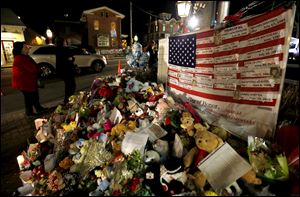
Conn. bill would keep some Newtown records private
Some call it blow to government transparency
6/2/2013
A U.S. flag displays the name of 26 victims killed at Sandy Hook Elementary School stands at a makeshift memorial in the Sandy Hook village of Newtown, Conn., in December.
HARTFORD, Conn. — A plan by Connecticut officials to withhold some Newtown school shooting records from the public would be another blow to government transparency, which has taken hits in other states in recent years, advocates for freedom of information laws say.
The proposal is in a bill privately crafted by Gov. Dannel P. Malloy’s office, the state’s top prosecutor and legislative leaders. It would allow authorities to withhold from the public photographs, videos, 911 call recordings and other records depicting the physical condition of any victim of the Dec. 14 shootings, unless the family gives written permission.
The legislation would bar the release of emergency responders’ audio transmissions but allow the public to view transcripts of the recordings at a cost of 50 cents a page. The bill also would limit disclosure of the death certificates of the 20 first-graders and six educators killed in the attack to immediate family members only.
Media groups and advocates of public records laws worry the bill, which is pending, would set a bad precedent by exempting specific incidents from FOI laws. They say it would encourage other crime victims to ask the state to limit disclosure of records now routinely released to the public, and it appears to make the Newtown killings more important than the dozens of other killings in Connecticut each year.
They also question the bill being drafted in secrecy and not being subjected to the public hearing process like other bills are. The legislative session ends next Wednesday.
“If you hide away documents from the public, then the public has no way of knowing whether police ... have done their jobs correctly,” said Sonny Albarado, city editor at the Arkansas Democrat-Gazette and board president of the Society of Professional Journalists, a free press advocacy group based in Indianapolis.
“It sets a tone where it makes it easier to hide other things, and the public suffers, in my view,” Albarado said. “Obviously, the mass murder of 26 people is a very horrific crime. But 26 people die regularly in most large towns within a few weeks or within a few months and we don’t express the same kind of horror and we don’t afford those victims or the perpetrators any kind of anonymity.”
The SPJ and other media groups have noted their opposition to the bill in letters to Malloy, and several newspapers in the state have published editorials and columns criticizing the legislation.
Malloy is defending the proposal, saying that the state wants to protect and respect the wishes of relatives of the Newtown victims and that the bill applies only to the Sandy Hook shootings.
Parents of some Newtown shooting victims said at a news conference at the state Capitol on Friday that one of their main concerns was photos of the massacre scene being posted online.
“I’m fully supportive of an open and transparent government, but I can’t understand how distributing graphic photos of murdered teachers and children serves any purpose other than causing our families more pain,” said Dean Pinto, whose 6-year-old son, Jack, was killed in the school shooting.
“Unfortunately, newspapers are no longer the only disseminators of information,” he said. “The world of information has changed substantially over the past few years and our Freedom of Information laws need to adjust to the times. There are many who lack the common sense and decency of mainstream media (and) who will freely use these images for their own disgusting purposes.”
Albarado, the SPJ president, said there have been efforts in many states in recent years to restrict the release of public documents.
“I see, overall, just a general effort to erode FOI laws and public records laws throughout the country,” he said.
Officials in cities and towns where other mass shootings happened have handled the release of public records in different ways.
Colorado officials are denying media requests for records on the Aurora movie theater shootings last year that killed 12 people and injured 70. But 13 years ago, Colorado authorities released some surveillance video of the 1999 shootings at Columbine High School in Littleton that left 13 people dead, and those videos are all over the Internet.
After 32 students and faculty were killed at Virginia Tech in 2007, officials released some public records related to the shootings but not the 911 call recordings or the killer’s medical records.
Wisconsin authorities released 911 calls after six people were shot to death at a Sikh temple last year. In Manchester, Conn., police released 911 calls related to a 2010 shooting at a beer distributorship, where eight people were fatally shot by a co-worker, who also killed himself.
Colleen Murphy, executive director and general counsel of the Connecticut Freedom of Information Commission, said she has seen a chipping away of public disclosure laws by the state legislature and courts in recent years. Her agency enforces Connecticut’s public records and meetings laws.
Murphy said the commission is concerned about several bills in this year’s legislative session. They include proposals to exempt the pardon process from public view, further restrict information about government employees from being released and allow public agencies to charge people for just viewing public records.
And about a half dozen times since 2010, the state Supreme Court has overturned rulings by the Freedom of Information Commission after the commission ordered the release of public documents.
“I’ve seen a gradual sea change ... toward more people asking questions about why should the public have access to information instead of why shouldn’t they,” Murphy said. “We forget why we have these laws. Any record created by government belongs to the people.”